The Metta of Choice
By Mettamorphsis
Buddhistdoor Global
| 2019-06-04 | Welcome to another Living Metta experiment in taking metta meditation off the cushion and out into the world.
So far, these experiments have centred around various day-to-day interactions and work settings. This month’s is more specific and follows on from a 10-day Vipassana meditation course I helped manage during the last US presidential election* and an Easter Vigil service that unexpectedly found me generating metta for the then British prime minister.**
When breaking nine days’ silence on the penultimate day of a 10-day Vipassana meditation course (known as Metta Day), most students are bursting to share their experiences and insights with their fellow students. In November 2016, however, nearly all students’ first question was to ask me (the course manager) who had won the US presidential election! Digesting the news of Donald Trump’s surprise win gave many a true test of back-to-reality equanimity. And three days after attending the same Easter Vigil service as an exhausted Theresa May and silently sending her metta, she called a surprise general election in 2017.
Back in 2019, the Dharma led me to count votes for Liverpool’s local elections (2 May) and European elections (23 May). If you’ve never participated behind the scenes in an official vote, I’ll briefly summarise the process.
After the city’s polling stations closed, vans delivered the sealed ballot boxes to a tennis centre where some 300 local citizens sat at trestle tables—each representing a ward—ready to begin counting.
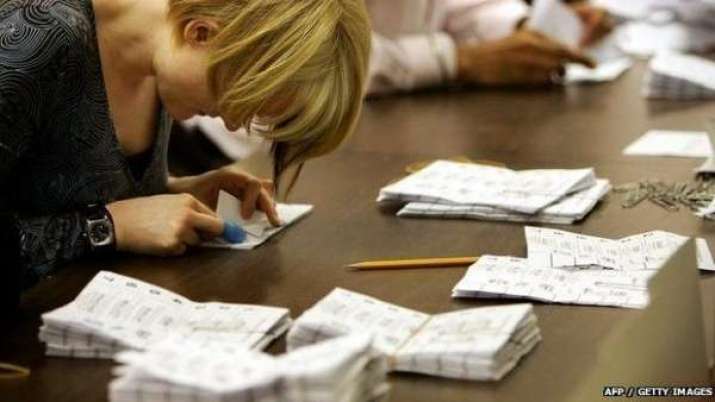 Hand counting paper ballots. From peopledemandingaction.org
Hand counting paper ballots. From peopledemandingaction.orgThe first stage was collating actual paper ballots into bundles of 20 to make sure physical numbers matched the administrative ones—i.e. postal votes sent in advance and those votes cast at polling stations earlier that day.
For such a strict process behind locked doors and under police guard, it was also a surprisingly transparent one: the political candidates and TV crews were free to roam the room to ensure we counters weren’t secretly stuffing ballot papers down our bras or under tables or spoiling them with extra crosses.
Three Labour Party candidates decided to watch me count to get a straw poll guess of final results for the local elections. The attachment to outcome was palpable and I became curious about what they were truly clinging to: Winning? Power? Influence? A chance to do good? A desire to change the world? I silently experimented with generating metta for all involved as I counted to 20 over and over again, while making the ticked boxes as visible as possible to their hungry eyes.
Whether it was the metta or the guesstimate that their political party would probably win this particular ward, their shoulders and breathing visibly relaxed and slowed.
While I’m not particularly political myself, I do feel strongly about voting itself if nothing else given how many countries still don’t get a transparent say in who leads them and as a debt of gratitude for women’s suffrage. Not unlike meditation: I don’t believe metta or voting magically determine a particular outcome, but rather invites the Dharma to guide us toward highest good of all concerned.
And all too often when I hear someone complain in day-to-day conversation about the state of the world and how nothing changes, I'll innocently ask them if they voted. The answer more often than not is no. Not unlike meditation: I don’t believe metta or voting instantly changes anything, but rather invites the Dharma to change things at the best pace for the highest good of all concerned.
Being a natural optimist, I like to believe there is a collective wisdom of sorts when we all participate as James Surowiecki explores in his excellent book The Wisdom of Crowds: Why the Many Are Smarter Than the Few and How Collective Wisdom Shapes Business, Economies, Societies and Nations (Abacus 2004). And, for any readers who missed the Kevin Costner film Swing Vote in 2008 (released in time to remind American viewers to vote that pivitol election year), it’s worth revisiting for a more comic version of what a friend once prosaically quipped about participation of all sorts: “If you’re not at the table, you’ll be on the menu.”
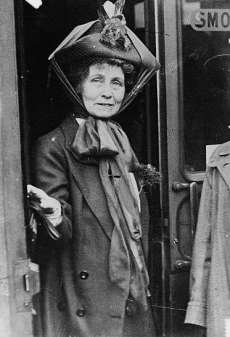 Emmeline Pankhurst. From wikipedia.org
Emmeline Pankhurst. From wikipedia.orgThe year 2018 marked the 100-year anniversary of British women being granted the vote and being elected into the House of Commons, and I smiled to myself sitting only some 40 miles from the birthplace of Emmeline Pankhurst, the suffragette Time magazine named one of the 100 most important people in the 20th century stating:
She shaped an idea of women for our time;
she shook society into a new pattern from which there could be no going back.
Change for the highest good of all concerned may not be happening as quickly (or as slowly!) as some of us might like, but—taking a longer view than calendar years or political terms—it is happening. Around me milled many female political candidates and, whatever readers may think of Margaret Thatcher or Theresa May’s politics, the UK has already elected two female prime ministers since 1918. More globally, some 25 countries currently have elected or appointed women as heads of state. And only last year, New Zealand’s prime minister Jacinda Arden gave birth to a daughter while in office.
As we waited until all the election coordinators were satisfied that the number of physical ballots matched the voting register numbers for the entire room—a process that can take some two or three recounts—I chatted with my trestle-table neighbors. With the media reporting on the so-called apathy of youth, it was heartening to discover the two young women flanking me were law and political science undergraduates.
We were surprised at the low voter turnout—less than a third of the city eligible to vote—and debated how introducing compulsory voting (like in Australia) might change the UK’s political landscape. We also lamented the rise of political parties and independents with overtly racist platforms (i.e. blame anything and everything on immigration) in the face of Brexit. We compared notes about how separation of all kinds seemed to be cropping up all over the globe, both metaphorically and quite literally with Trump’s talk of a border wall with Mexico!
The parallel between political separation/othering “solutions” and spiritual dualism teachings piqued my metta experimenter’s curiosity. By that stage, me generating metta couldn’t rationally influence this election’s outcome, but perhaps it could help soften the collective anxiety I was sensing in the tennis center, the city, and the country overall?
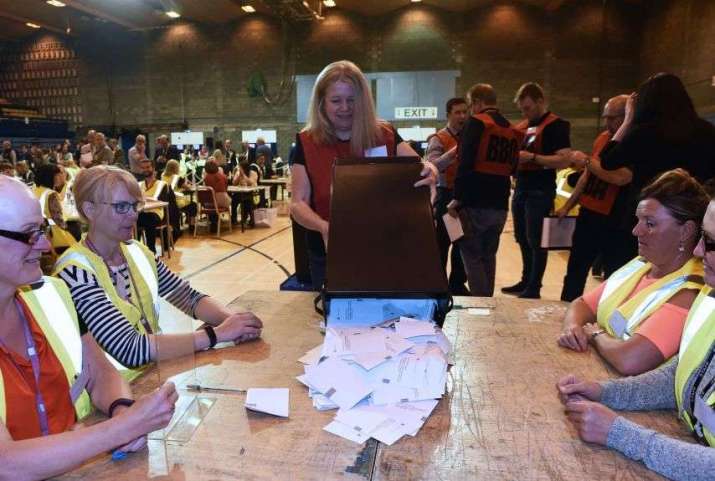 British election workers. From mercurynews.com
British election workers. From mercurynews.comThe vote coordinators then dramatically emptied all the ballots onto tables, and the second stage of the evening began: sorting into votes according to the different parties. We counted and stacked as fast and furious as any casino blackjack dealer.
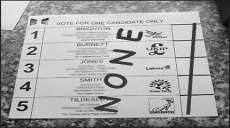 From votenone.org.uk
From votenone.org.uk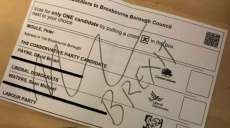 From itv.com
From itv.comLiverpool is traditionally a Labour Party stronghold, and their pile was soon overtaking the others in both elections. However, the pile I personally found most interesting was the tray of queries. Some voters had drawn a line through all boxes—these get recorded as a protest vote and could potentially lead to a new election if numbers are high enough—while others deliberately left all boxes blank (these get recorded as a spoilt vote which can’t influence anything). Some wrote whole essays using coloured markers, while others used colourful language. This tray later got sifted by a representative from each party to agree what the voter's intention was.
Once a ward count was verified, the local count was announced from a central podium in front of an enormous results screen. For the European count, the numbers were passed on to Manchester to be added to the overall results for North West England. As I silently continued to bless all concerned, Labour’s landslide local victory was growing obvious. Less obvious, however, was how in nearly every ward the second choice wasn’t one of the other major parties but the Green Party.
Decades ago, the Green Party was generally considered a fringe environmental group and I was thrilled to see them gently taking their place at the major players’ table. I have always admired their scrutiny of the other parties on social justice and environmental issues or, in more spiritual terms, for looking out for the best interests all sentient beings—not just registered voters.
Perhaps non-dualism is very gradually “trumping” so-called separation solutions much sooner than any of us imagined?
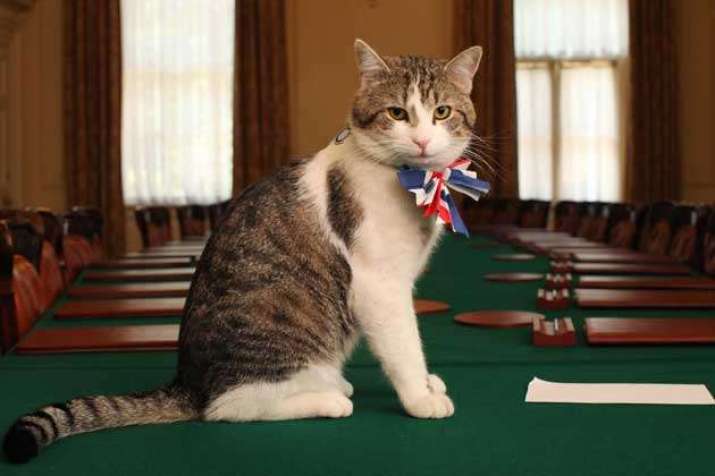 Larry, Chief Mouser to the Cabinet Office. From wikipedia.org
Larry, Chief Mouser to the Cabinet Office. From wikipedia.orgWaiting for the different stages of both counts, my metta experimenter’s imagination chuckled over the practicalities of how to give all sentient beings their vote. Larry, Chief Mouser to the Cabinet, is currently making inroads at 10 Downing Street. Perhaps tellingly, there is currently no pet-in-residence at the White House.
While I don’t pretend that my metta experiment swayed the actual results of either election, I came away feeling grateful to live in a time and place where I can take a seat at the table with my vote.
To those readers who feel nothing changes, or that individuals can’t affect change, or that there is only a single solution possible, I’ll respectfully ask you to experiment taking a longer view of change and personal power and possibilities and vote for metta in exercising any large or small choices currently available to you:
May all beings vote for happiness.
May all beings vote for freedom.
May all beings vote for peace.
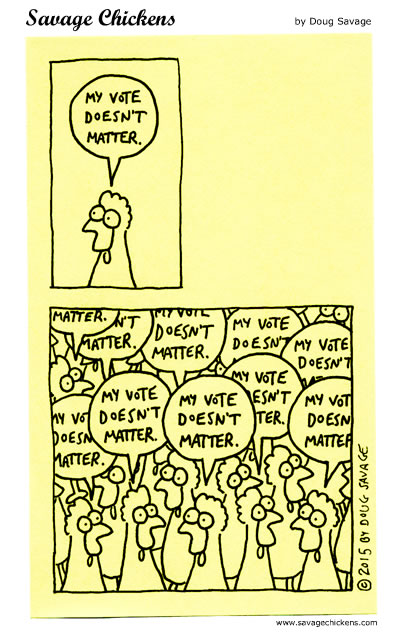
From savagechickens.com

























